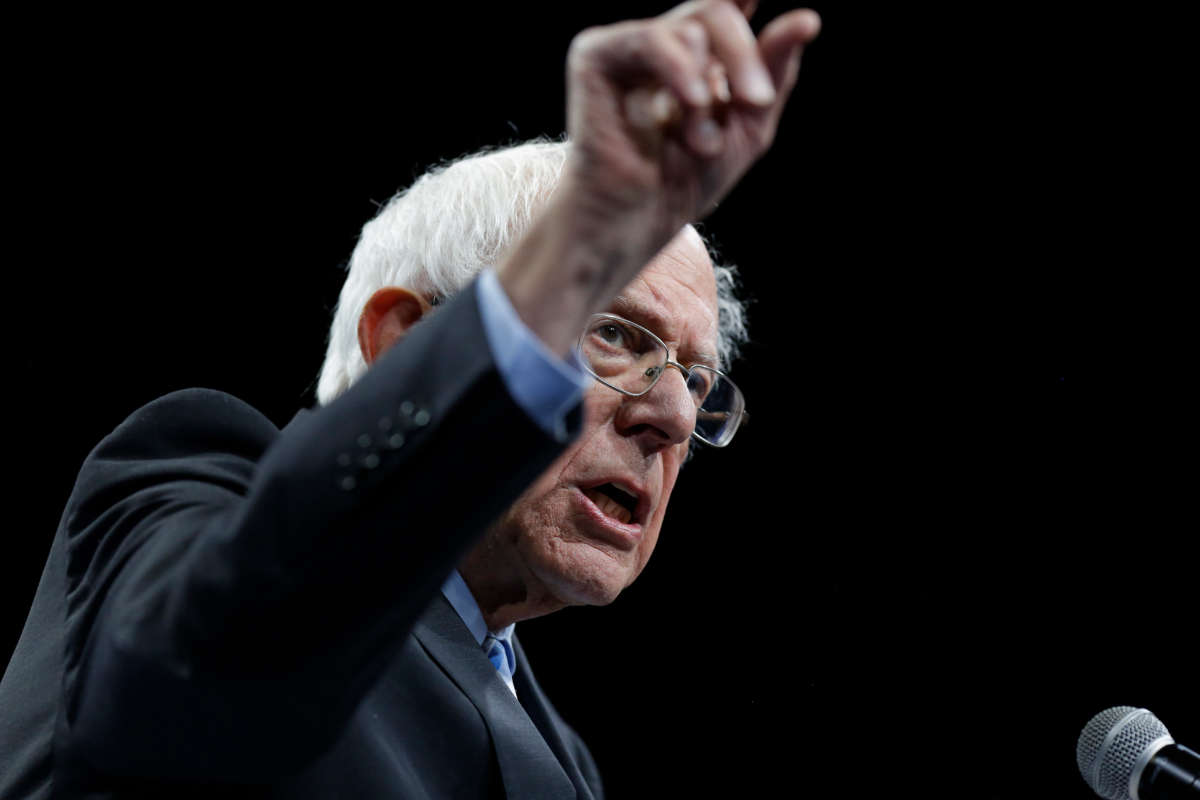Did you know that Truthout is a nonprofit and independently funded by readers like you? If you value what we do, please support our work with a donation.
Senate Budget Chairman Bernie Sanders (I-Vermont) has called on top oil and gas executives to testify at a hearing on “The Cost of Inaction on Climate Change” before the budget committee next Thursday.
The senator invited BP America President David C. Lawler, Chevron CEO Michael Wirth and ExxonMobil CEO Darren W. Woods to testify. Sanders told CBS that Lawler has already denied the request sent on Tuesday. “These guys don’t want to answer hard questions,” Sanders said. BP, Chevron and ExxonMobil are some of the biggest carbon emitters in the world.
Sanders told CBS that the distortion of climate research by the oil and gas majors over the past decades is “one of the scandals of our lifetime.” Research and reporting have found that companies like Exxon have participated in a decades-long disinformation campaign in order to sow doubt over whether or not fossil fuels cause global warming and climate change.
“These companies are producing a significant percentage of the carbon that we use, which is destroying our planet,” Sanders told CBS, “and we want to know what they are doing to transform their companies away from fossil fuel.”
A press release for the hearing cited the potential economic toll of failing to address the climate crisis.
“Inaction on climate change could eventually cost the U.S. $34.5 trillion in economic activity by the end of the century and cause up to 295,000 avoidable deaths by 2030 and one million by 2050,” read the press release. “In 2020, while 22 weather disasters in the United States caused a total of $95 billion in damages,” while Exxon, Chevron and BP have raked in tens of billions of profits, says the statement.
“In addition to these company profits, American taxpayers are currently on the hook for about $15 billion per year in direct federal subsidies to the fossil fuel industry,” the press release said. “In 2019, the fossil fuel industry spent $190 million lobbying Congress for more polluter welfare and the fossil fuel industry received more than $8.2 billion in benefits from the CARES Act.”
In recent years, oil and gas companies have touted their investments in clean energy and have even made pledges to reduce their carbon outputs, but reporting has shown that many of their claims are nothing more than greenwashing — PR campaigns that attempt to trick consumers into thinking that the companies and their products are more environmentally friendly than they actually are.
President Joe Biden has made some steps to try to end the federal government’s direct subsidization of the fossil fuel industry, but his purview as president is limited and activists say that his actions are not enough.
In his recent tax plan, Biden has proposed ending $35 billion over the next decade in tax credits and loopholes for the fossil fuel industry, but can only control about 20 percent of the $15 billion in direct subsidies that the fossil fuel industry receives from the federal government each year.
A recent study published in the Proceedings of the National Academy of Sciences has also shown that, aside from tax credits and direct subsidies, the fossil fuel industry also receives an estimated $62 billion in “implicit subsidies” each year. Implicit subsidies are costs that are absorbed by the government or the public via externalities — costs to public health and environmental damage — but that fossil fuel companies don’t pay.
“Fossil fuel companies benefit in a big way because prices currently do not reflect the environmental and social costs associated with the production and consumption of fossil fuels,’’ said study author Matthew Kotchen in a press release. “A change would really affect their bottom lines.” If it weren’t for these implicit subsidies, Kotchen finds, the entire coal industry would likely go bust.
Climate advocates have urged Biden to throw his support behind the End Polluter Welfare Act, which addresses some of the more direct subsidies given to the fossil fuel industry. Introduced by Sanders, Rep. Ilhan Omar (D-Minnesota), and others last summer, the bill would end the direct subsidies, close tax loopholes and bar extraction on federal lands.
“At a time when we are dealing with the coronavirus pandemic and an economic decline, it is absurd to provide billions of taxpayer subsidies that pad fossil-fuel companies’ already-enormous profits,” said Sanders at the time. “We need more safe, healthy, good paying jobs — not more corporate polluter giveaways.”
A terrifying moment. We appeal for your support.
In the last weeks, we have witnessed an authoritarian assault on communities in Minnesota and across the nation.
The need for truthful, grassroots reporting is urgent at this cataclysmic historical moment. Yet, Trump-aligned billionaires and other allies have taken over many legacy media outlets — the culmination of a decades-long campaign to place control of the narrative into the hands of the political right.
We refuse to let Trump’s blatant propaganda machine go unchecked. Untethered to corporate ownership or advertisers, Truthout remains fearless in our reporting and our determination to use journalism as a tool for justice.
But we need your help just to fund our basic expenses. Over 80 percent of Truthout’s funding comes from small individual donations from our community of readers, and over a third of our total budget is supported by recurring monthly donors.
Truthout has launched a fundraiser to add 379 new monthly donors in the next 6 days. Whether you can make a small monthly donation or a larger one-time gift, Truthout only works with your support.
